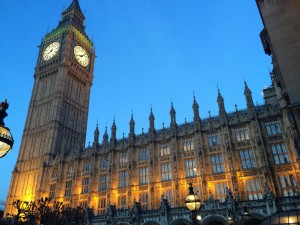Earlier this week, author and Everyday Sexism founder Laura Bates spoke at an Abortion Rights event in Parliament on protecting women from harassment and abuse at UK clinics. She gave me permission to share the speech here, as part of International Anti-Street Harassment Week:
 Let’s be very clear –this is not a debate about abortion. That debate already takes place, vociferously, elsewhere, from our parliament to our media to our universities to our streets.
Let’s be very clear –this is not a debate about abortion. That debate already takes place, vociferously, elsewhere, from our parliament to our media to our universities to our streets.
This is not about freedom to have a conversation that is already happening widely. This is about harassment. It is about the aggressive, intimidating, upsetting experience of women being harassed at the point of access to a wide variety of different healthcare services, including reproductive healthcare.
This is not about protest, which could take place anywhere, it is about bullying women, making them feel anxious, creating a hostile and unpleasant environment for both service users and healthcare workers.
This is not a debate about abortion.
Because anybody who wants to have a real impact on abortion recognises that place to do so effectively is not at the point of access, but in and outside parliament, where policy is debated, not outside clinics where women already have the legal right to access services and should be able to do so without fear, harassment and intimidation.
The impact on women at what may be a very vulnerable, private and personal time must not be underestimated. Harassment doesn’t have to include shouting, threats or abuse to be deeply impactful and upsetting. Simply being shown some of the extremely graphic and sometimes inaccurate images protesters often hold, being filmed against one’s wishes at this private time, or being made aware that somebody is actively praying against you can cause huge emotional turmoil and distress. When a United Nations Delegation on human rights visited an abortion clinic in Alabama and experienced anti-choice protesters outside, they described it as “a kind of terrorism”.
Writing about their experiences of clinic harassment on Twitter, women said:
It made me feel like I was taking the walk of shame
It made me feel sick
I’ve never seen anything like that in real life
The protesters scared me
One woman wrote:
I used to work at an abortion clinic. Now I’d be too scared.
There is no reasonable argument that such harassment is necessary or effective, because there can be no reasonable argument that any woman reaching the point of attending an appointment with an abortion provider hasn’t already heard the arguments against abortion – because we live in a society where these arguments are everywhere. No woman grows up thinking of her control over her own body as complete and unchallenged, because we do not live in a society where that notion goes without loud and vigorous debate, and indeed, because we live in a society where our sisters in Northern Ireland, for example, are still denied such basic rights.
In fact, women are forced to hear other peoples’ opinions about abortion throughout their lives, as these Everyday Sexism Project entries show:
“While in year 10 my science teacher felt it appropriate to share his views on how he believed abortion was too flexible and should not be allowed up to 24 weeks. After telling him that I believed that it should be allowed up to 24 weeks he looked at me in disgust and told me that ‘those’ women should not be allowed to have children at all.”
“A male colleague told me men should decide about abortion law and time limits because women are too emotional and have a personal bias which is why we have 24 weeks which he says is “really late” and puts too much focus on “what the woman herself wants”.”
“In my 1st year at University I remember a young man standing up and announcing: “I would never date a woman who has had an abortion, this is disgusting, these kind of women are damaged goods.”
“My husband said that a women should be able to decide to take her top off for men if she wants to that she should have control over her own body but that a woman should not be able to have an abortion because that is murder”
“I was watching a discussion of abortion on a political panel show. There was one woman who kept trying to speak up while the men around her loudly spoke against abortion. She even tried to start sentences like ‘well since this is an issue that particularly affects women…’ but the man next to her said ‘hold on a second, let me finish’. The show went to commercial and moved on to a new subject before she got to speak at all.”
Across society, the voices we hear least in debates about abortion are those of people who have actually had one. Women are shouted down in these conversations because a lot of these conversations are driven by thinly veiled misogyny. The sexist idea that bearing children is a woman’s sole purpose and responsibility. The patriarchal notion that society has a greater right to dictate what happens to a woman’s body than she does herself. The misogynistic idea that women’s lives are less important.
That’s why it is so vitally important that at the point when a woman is accessing the reproductive healthcare which is her legal right, she is, in that moment, at the very least, able to do so safely, without harassment, bullying, shaming or intimidation.
This is not a debate about abortion. It is about harassment, misogyny and bullying.
